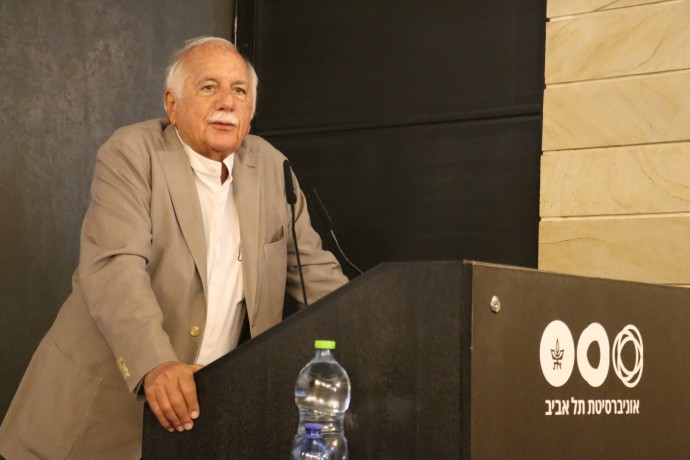Moshe Safdie, the internationally renowned architect, urban planner, educator, theorist and author, awarded the Michel Gelrubin Architecture Prize (MiG) to three architecture students at Tel Aviv University for their extraordinary projects, marked by the climate crisis and global pandemics.
First place went to the joint project "Global Narratives" by Zohar Naim, a fifth-year architecture student, and architect Barak Weizman, a graduate of the School of Architecture. The winning project is a design proposal for the Holocaust Museum in Montreal, Canada, which attempts to bridge the foreign programmatic essence of the building and the everyday urban environment in which it is located.
Architect Barak Weizman also received the second-place award with a different project, and students Adi Eshkol and Yonatan Berkowitz won third place. The event took place as part of the university's Board of Trustees events, in the presence of the university's president Prof. Ariel Porat and Prof. Eran Neuman, dean of the Faculty of Arts.

Zohar Naim and Barak Weizman: "In planning, we created a connection between the 'global' and the 'local' through architectural choices and materials related to the location, as well as through encounters between Canadian urban life and Holocaust memory that combine 'sacred' and 'profane.' We are delighted to have won for a project that strengthens the connection to Jewish identity, especially at a time when questions arise concerning the identity and essence of the Jewish-democratic state in which we live. On this occasion, we would like to thank our supervisors, Prof. Arch. Eran Neuman and Arch. Dafna Matok for their guidance and support along the way."
This year's MIG Prize challenge was to think about how construction design is redefined in the face of global challenges, including the climate crisis and global pandemics. The proposed project needed to make a clear statement regarding the situation of the locality in which the project would be built, with an emphasis on environmental, cultural, and social aspects. They also had to present their architectural implications in the design while being rooted in the place's past and offering a vision of a possible future.
In addition to awarding the prestigious prize, architect Safdie presented a three-part lecture series exploring the evolution of high-rise modular housing systems – assessing their relative qualities and challenges and the environmental and quality of life issues inherent in the typology.
In his introductory remarks to the lecture series, Prof. Eran Neuman, Dean of Tel Aviv University, noted that "Moshe Safdie is a groundbreaking architect who, already from his first project, Habitat 67 in Montreal, challenged the field of architecture. Today, sixty years later, with projects such as the Crystal Bridges Museum of American Art and Marina Bay Sands in Singapore, he is still fascinating and innovative."
Moshe Safdie noted that he wants his buildings "to look as if they have always been there, in order to try to merge the future and the past. This difficult task is an interdependent process of integration and diversity, in which a local design is recognized in the world and constitutes an engine of innovation."
